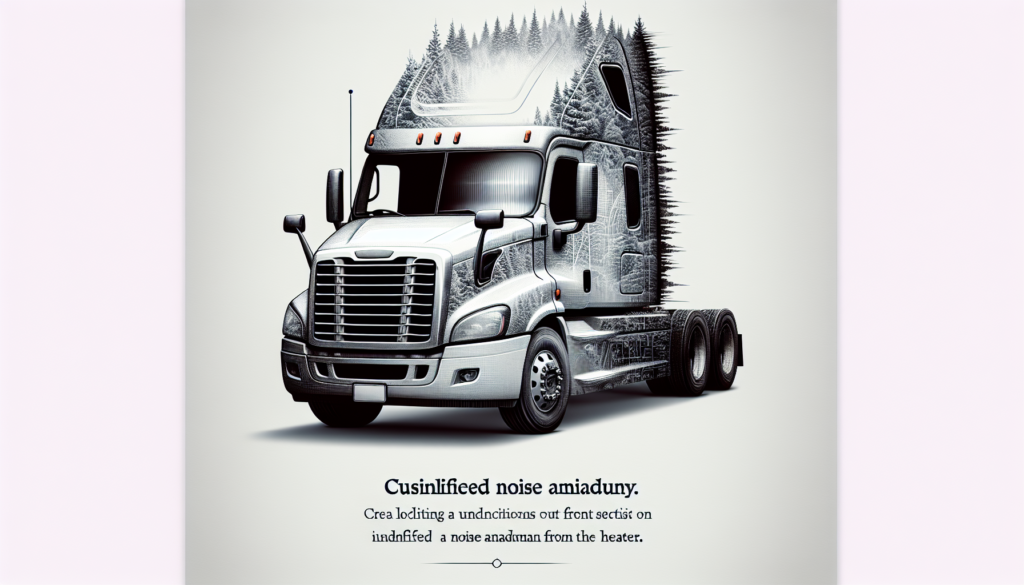
Have you ever found yourself puzzled by the perplexing sounds your Cascadia’s heater emits every time you switch it on? In this informative piece, we’ll decisively get to grips with the mystery. We’ll shine a light on the potential culprits, reviewing common causes ranging from faulty mechanisms to everyday wear and tear. Armed with this knowledge, you’ll be well equipped to tackle the unidentifiable noise that’s been haunting your heater system, restoring peace to your home once again.

Understanding Your Cascadia’s Heating System
When you’re out on the road for long hours, having a functioning heater in your Cascadia truck is as necessary as it is comforting. Having a solid understanding of how your heating system works can make the difference between a comfortable journey and an unpleasant trip – particularly during the colder months. In this article, we’ll go through the basics of your truck’s heating system, some common issues that may arise, and how they can be resolved.
Components of the Cascadia Heating System
The heating system in your Cascadia truck consists of several key components. The first one is the heater core, which is almost like a small radiator. It enables heat transfer from the hot coolant to the air blown by the heater fan. The air blend doors direct the flow of air through the heater core and into the interior of the truck. The blower fan can speed up or slow down, depending on how much you adjust the controls, to regulate the volume of air pushed into the cabin.
How the Heater Operates
The heating operation in your truck initiates when the hot coolant is directed to the heater core. As the coolant passes through the core, it radiates heat. At the same time, the blower fan draws in cooler air from inside the truck, which passes over the heater core, absorbs the heat, and is then directed into the truck’s cabin. This incoming warm air elevates the interior temperature and keeps you warm!
Common Heating System Issues in Trucks
Despite its simplicity, the heating system can sometimes face issues requiring troubleshooting. Noise is a common symptom which can signal a problem within the heating system. A troublesome heater might produce odd hissing, rattling, or humming sounds. These could each be indicative of different problems, from a simple debris blockage to more serious mechanical or electrical issues.
Initial Troubleshooting Steps
Before you take your truck to a professional mechanic, there are a few steps you can take to potentially identify what’s causing the heater noise.
Observing When the Noise Occurs
Firstly, pay close attention to when the noise occurs. Is it present only when the heater is operating? Does the intensity of the noise change with the speed of the fan? These details can help identify the source of the problem.
Checking for Visible Signs of Malfunction
Physical examination of the accessible parts of the heater system can also yield useful information. Check for any visible signs of wear and tear, like frayed wires, loose connections, or blockages in the air vents.
Consulting the Vehicle Manual
Remember, your vehicle’s manual can also be a valuable resource for troubleshooting issues and understanding more about how your truck’s heating system operates.
Types of Heater Noises and Potential Causes
Different noises from the heater can hint towards different problems. Here are a few possible causes:
Rattling or Knocking Sounds
These noises often indicate physical issues like a loose component or an object that’s snuck into the system. The offending item could be rattling around within the system, causing a disturbance when the heater is on.
Whistling or Hissing Noises
These sounds could suggest a leak within the system, perhaps caused by a cracked or unsealed component that allows air to escape.
Humming or Buzzing Sounds
Such noises can sometimes point towards electrical problems or a worn-out motor.
Debris and Obstruction Related Noises
Foreign objects can often sneak into the heating system, producing unwanted sounds.
Leaves and Twigs in the Heater System
Small bits of leaves or twigs could wind up in the heater system, especially during the fall. They can be sucked into the heating system through outdoor vents and cause unusual noises.
Dirt and Other Foreign Objects
Dirt and other debris can also accumulate within the system and generate a rattling sound when the heater operates.
Checking and Cleaning Air Intake Vents
If you suspect debris is causing noise, it’s worth taking a look at the air intake vents. Carefully remove any visible debris and consider cleaning the vents to prevent future blockages.

Mechanical Issues Behind Heater Noises
Sometimes, the reason for the noises could be mechanical failures within the system.
Faulty Blower Motor
The blower motor is a crucial part of the heating system, and if it begins to fail, it may produce a humming or buzzing sound.
Worn Out Bearings
The blower motor’s bearings help it operate smoothly. Worn-out bearings could lead to knocking or grinding sounds when the blower motor rotates.
Loose or Damaged Fan Blades
Rattling noises could be due to loose or damaged fan blades whirling around clumsily within the blower assembly.
Electrical Problems Leading to Noises
Electrical problems within the heater system can also be a cause for various abnormal noises.
Short-Circuit in Heater Controls
A short-circuit in your heater’s electrical controls could lead to buzzing or humming sounds.
Failing Resistors or Capacitors
If these components are failing, you may notice a similarly disruptive buzzing noise.
Wiring Issues
Problems in the wiring of the heater controls can also generate abnormal noises when the system is operating.

Coolant System Malfunctions
Issues related to the coolant system could also cause heater noises.
Air Bubbles in the Heater Core
Air bubbles in the heater core might create gurgling sounds when the heater is operating.
Leaks in the Coolant System
Leaks could possibly cause a whistling or hissing sound if the heater controls are malfunctioning.
Radiator Issues Affecting Heater
Finally, if the radiator isn’t functioning properly, it could affect the performance of your heater and generate some unwanted noises.
Ductwork and Ventilation Complications
Issues in the ductwork and ventilation routes can contribute to heater noise as well.
Blocked or Crushed Ducts
Blocked or crushed ducts can cause whistling noises as the air flow is disrupted.
Misaligned Flaps in Ventilation System
Misalignment of flaps in the ventilation system could lead to them vibrating or rattling when air moves past them.
Faulty Actuators or Controllers
If these components controlling the movement of flaps fail, they could produce unusual sounds.

Diagnostic Tools and Approaches
If all your initial troubleshooting doesn’t solve the issue, it might be time to use some diagnostic tools or seek professional help.
Using OBD-II Scanners for Troubleshooting
An onboard diagnostic scanner can read problem codes sent by sensors within your truck. This information might help identify specific issues with the heating system.
Performing HVAC Diagnostic Tests
These tests can help identify issues relating to the heating, ventilation, and air conditioning in your truck.
When to Seek Professional Diagnostics
If you’re unable to identify or fix the issue yourself, it may be time to consult a professional mechanic. They have the advanced tools and specific knowledge necessary to handle complex repairs.
Preventing Future Heater Noises
Prevention, as they say, is better than cure. Let’s look at some ways you can avoid future heater noises in your Cascadia.
Regular Inspection and Cleaning
Regularly inspect and clean your truck’s heating system to prevent the buildup of debris and detect any developing issues early.
Timely Replacement of Worn Components
If components in the heating system like fan belts or the blower motor show signs of wear, replace them in a timely manner.
Importance of Using Quality Parts
Using high-quality replacement parts can ensure the longevity and efficient operation of your heater. It may seem like an unnecessary expense at the time, but it can save you trouble and money in the long run.
Understanding, troubleshooting, and maintaining your truck’s heating system doesn’t have to be complex and intimidating! With a little knowledge and regular attention, you can keep your Cascadia’s heater in top shape and ensure comfortable and worry-free rides.
